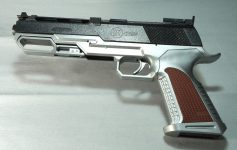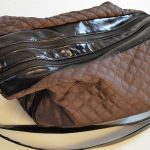Should Toy Guns Be Banned?

In response to gun-related crimes such as the Lindt Café siege, there has been ongoing discussion about firearms regulation, with NSW politicians promising to crack down on gun crime in Sydney.
Recently, the NSW Police Force announced the establishment of ‘Taskforce Magnus,’ a specialised unit dedicated to investigating recent public place shootings and alleged organised criminal activities associated with them.
However, the debate has now expanded beyond real firearms. After a young boy was photographed walking through Martin Place holding a realistic toy gun modeled after the infamous AK-47 assault rifle, questions have arisen about whether toy guns should also be banned.
Supporters of this view say that tougher laws are needed to prevent tragedies from occurring – and to dissuade children from believing that guns are ‘cool.’
But others believe that kids should be allowed to play with toy guys, and that overregulation of children’s toys simply shows that we are becoming a ‘nanny state.’
Toys and Tragedy
Children have enjoyed playing with toy guns for generations, with the very first toy guns used to imitate cowboys, soldiers and police. These days, there are a wide array of toy weapons for kids to choose from – with everything from Nerf guns to water pistols and cap guns, and even super-realistic models of assault rifles.
But in recent years, some concerned parents have boycotted the toys, arguing that they pose a risk to the safety of their children and the wider public as they may be mistaken for real weapons.
One tragic case involving a 12-year-old child in the United States illustrates these dangers.
The boy, Tamir Rice, had been playing with a toy gun in a park in Cleveland, Ohio. A member of the public called police and reported that ‘a guy with a gun is pointing it at people,’ but also mentioned twice that the gun was probably fake. The caller also mentioned that the person was ‘probably a juvenile.’
What happened next can only be described as a horrific incident – one that can potentially be attributed to the overzealous actions of police officers. Video footage of the incident was in stark contrast to the version put forth by police, showing that Rice did not pull out the toy gun – or even have it in his hands – when police fired at him twice, hitting him in the abdomen. The boy tragically died the following day as a result of his injuries.
It was later discovered that the ‘gun’ was in fact a replica Airsoft BB-gun, but that the orange safety cap which usually identifies toy weapons had been removed. While the officers involved have been reprimanded for their actions, some have suggested that the tragedy could have been avoided had toy guns been banned.
Do Toy Guns Foster Violence?
Others argue that encouraging children to play with weapons promotes violence and teaches them that guns are acceptable, contrary to Australian laws and values.
The research on the topic is fairly inconclusive, with child psychologists pointing-out that most adults who played with guns as children do not go on to commit violent crimes.
However, many believe that playing with guys naturally leads to aggression.
Another argument against toy guys is that they could be used when carrying out crimes in an attempt to intimidate or coerce victims. That view is advanced by Police Minister Mike Gallacher in 2013, who says that governments face a challenge in ‘figur[ing] out how to work with industry to ensure that these things aren’t being used in hold-ups.’
In 2014, a 20-year-old man in Brisbane allegedly approached an off-duty police officer with a plastic handgun and pressed it against his chest, demanding money. He was later apprehended and charged with attempted robbery.
The previous year, two men aged in their 20’s were arrested and charged with armed robbery after holding up a pharmacy at Sydney University using a toy gun and stealing thousands of dollars in cash and prescription drugs.
Police say that banning the sale of toy weapons could prevent them from being used to commit these types of serious offences.
Existing Laws
So are there any laws currently in force concerning toy guns – and can you still be charged with an offence such as armed robbery if it involves a toy weapon?
Section 4D of the Firearms Act 1996 contains provisions relating to imitation firearms. It says that the Firearms Act ‘applies to imitation firearms in the same way that it applies to a firearm’ – but they are not required to be registered in the same way as firearms, and that no licence can be issued for an imitation firearm; although a permit may be issued.
An ‘imitation firearm’ refers to ‘an object that, regardless of its colour, weight or composition or the presence or absence of any moveable parts, substantially duplicates in appearance a firearm, but that is not a firearm.’
But it should be noted that the law explicitly states that objects produced and identified as children’s toys are not included in the definition of an ‘imitation firearm.’
The question of whether you can still be charged with an offence if it involves a toy weapon primarily depends on the type of offence in question.
Some offences under the Crimes Act, including armed robbery, require the prosecution to prove that you used an ‘offensive weapon’ whilst carrying out the act. An ‘offensive weapon’ refers to a dangerous weapon (including an imitation firearm), as well as anything that is made or adapted for offensive purposes, or anything that, in the circumstances, is used, intended for use or threatened to be used for offensive purposes, whether or not it is ordinarily used for offensive purposes or is capable of causing harm.
So, you would remain liable for offences like armed robbery even if you used an imitation weapon such as a toy gun.
The question of whether toy guns should be banned is a matter of opinion: with some seeing it as a ‘sign of the times’, while others finding it absurd – as just another indication that we are becoming an overregulated, ‘Nanny State’.






